If you've ever worried about whether your beloved dog might forget you after a prolonged separation, you're not alone. Dogs have an extraordinary capacity for remembering their owners that goes far beyond simple recognition. Their emotional intelligence and powerful sensory memory create lasting bonds that can withstand significant time and distance.
Understanding how dogs remember and maintain emotional connections is crucial for pet owners who may face temporary separations or life changes. Let's explore the fascinating world of canine memory and emotional attachment.
How Dogs Remember Their Owners
Dogs possess a remarkable ability to remember their owners through a complex system of sensory and emotional memory. Unlike humans, who rely primarily on visual and chronological recall, dogs use an intricate network of scent recognition and emotional associations to maintain their connections.
The Power of Canine Scent Memory
A dog's sense of smell is their primary method of recognition and memory storage. With approximately 300 million olfactory receptors (compared to humans' mere 6 million), dogs can detect and remember human scents with incredible precision. This means that even after months or years of separation, a dog can instantly recognize their owner through smell.
Emotional Associations and Memory
Memories for dogs are deeply intertwined with emotional experiences. Positive interactions, consistent care, and affectionate moments create strong neural pathways that persist over time. A dog doesn't just remember their owner's physical appearance; they remember how that person made them feel.
Factors Influencing a Dog's Memory of Their Owner
Length and Quality of Relationship
The duration and emotional intensity of the relationship significantly impact a dog's memory. Dogs who have shared long-term, positive relationships with their owners are more likely to maintain strong, persistent memories. This explains why rescue dogs can still form deep bonds with new families, carrying memories of previous caring relationships.
Age and Individual Differences
While most dogs have excellent long-term memory, individual differences exist. Younger dogs might form memories more quickly, while older dogs might have more entrenched memories based on years of companionship. Breed characteristics and individual personality also play roles in memory retention.
Scientific Insights into Canine Memory
Research has consistently demonstrated that dogs have episodic-like memory capabilities. They can remember specific experiences and associate them with particular emotions, proving that their memory is far more sophisticated than previously understood.
Recognition Beyond Time and Space
Studies have shown that dogs can recognize and respond to owners even after extended separations. Their excitement during reunions isn't just instinctual but a genuine emotional response rooted in sustained memory and attachment.
Maintaining Connection During Separations
For pet owners concerned about prolonged absences, there are strategies to help maintain your dog's sense of connection. Leaving items with your scent, maintaining consistent communication through caretakers, and ensuring positive experiences during separations can help preserve your emotional bond.
Frequently Asked Questions
Will my dog forget me if I leave them in kennels for a long time?
No, dogs typically do not forget their owners, even after extended periods in kennels. Their strong emotional memory and scent recognition help maintain the connection.
How do dogs remember their owners using scent and emotional associations?
Dogs use their powerful olfactory system to store and recall scent memories, combined with emotional experiences that create lasting neural connections.
Can dogs recognize previous owners after years of separation?
Yes, dogs can often recognize and remember previous owners, especially if those relationships were significant and positive.
How long does it take for a dog to start missing its owner?
Dogs can begin showing signs of missing their owner within hours of separation, demonstrating their strong emotional attachment.
Why does my dog react excitedly after long absences but seem calm with short separations?
Longer separations trigger more intense emotional responses, while short separations are often perceived as routine by dogs.
Understanding your dog's memory capabilities can help you appreciate the depth of your bond and approach separations with compassion and knowledge.






